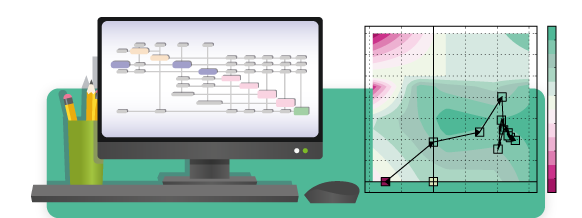Main Concepts
Discipline
Define an input-output discipline to interface a model.
Features: analytic expressions, executable, surrogate model, much more.
Design space
Define a set of parameters, typically design parameters.
Features: deterministic parameter space, uncertain (or mixed) parameter space.
Scenario
Define an evaluation process over a design space for a set of disciplines and a given objective.
Features: DOE scenario, MDO scenario.
Features
Study analysis
An intuitive tool to discover MDO without writing any code, and define the right MDO problem and process. From an Excel workbook, "specify your disciplines, design space, objective and constraints, "select an MDO formulation and plot both coupling structure (N2 chart) "and MDO process (XDSM), even before wrapping any software.
Surrogate models
Replace a discipline by a surrogate one relying on a machine learning regression model.
Based on OpenTURNS, scikit-learn.
Scalable models
Use scalable data-driven models to compare MDO formulations and algorithms for different problem dimensions.
Features: scalability study, scalable problem, scalable discipline, diagonal-based.
Machine learning
Apply clustering, classification and regression methods from the machine learning community.
Features: clustering, classification, regression, quality measures, data transformation.
Based on OpenTURNS, scikit-learn.
Uncertainty
Define, propagate, analyze and manage uncertainties.
Features: distribution, uncertain space, empirical and parametric statistics, distribution fitting, sensitivity analysis.
Based on OpenTURNS.

